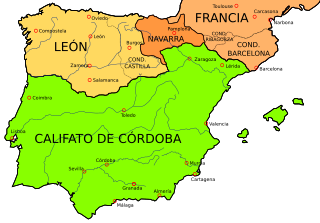 W
WThe Battle of Aqbat al-Bakr was a battle of the Fitna of al-Andalus that took place in the area in and around Espiel, Spain. The battle took place between the forces of the Caliphate of Cordoba, whose forces were commanded by Sulayman ibn al-Hakam, and the Muslim rebel forces of the Catalan-Andalusian alliance trying to overthrow their Caliph overlords under the command of Muhammad ibn Hisham; Wadih al-Siqlabi, governor of al-Tagr al-Awsat; and several West Frankish counts and bishops, including Ermengol I of Urgell, Hugh I of Empúries, and Ramon Borrell of Barcelona.
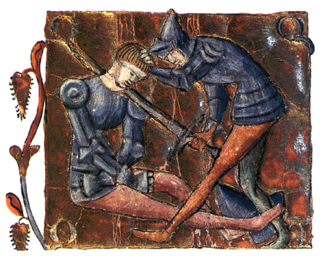 W
WThe Battle of Bairén was fought between the forces of Rodrigo Díaz de Vivar, also known as "El Cid", in coalition with Peter I of Aragon, against the forces of the Almoravid dynasty, under the command of Muhammad ibn Tasufin. The battle was part of the long Reconquista of Spain, and resulted in a victory for the forces of the Kingdom of Aragon and the Kingdom of Valencia.
 W
WThe Battle of Cabra took place in 1079 in southern Iberia between two Islamic states, Granada and Seville. Each side was aided by Castilian knights under Alfonso VI. It resulted in a victory for El Cid, who routed the invading forces of Emir Abd Allah of Granada and his Christian allies led by Count García Ordóñez. El Cid captured Ordóñez and other Christian knights and held them for three days until releasing them to return to Castile.
 W
WThe Siege of Al-Dāmūs was a battle of the Reconquista that occurred in the year 1210. The forces of the Kingdom of Aragon, together with auxiliary forces of the Knights Templar and Knights Hospitaller, were pitted against the defending forces of the Almohades. The Christian forces defeated the Muslim defenders. This battle was significant because in taking the castle at Ademuz, the Christian forces riled their Muslim opponents to initiate a grand offensive that would eventually culminate in the Battle of Las Navas de Tolosa. This offensive, in turn, marked the end of the Islamic domination of the region and the beginning of Christian rule in the province.
 W
WThe Battle of Fraga was a battle of the Spanish Reconquista that took place on 17 July 1134 at Fraga, Aragon, Spain. The battle was fought between the forces of the Kingdom of Aragon, commanded by Alfonso the Battler and a variety of Almoravid forces that had come to the aid of the town of Fraga which was being besieged by King Alfonso I. The battle resulted in an Almoravid victory. The Aragonese monarch Alfonso I died shortly after the battle.
 W
WThe siege of Jaén was one of many sieges on the city during the long Spanish Reconquista. The siege, which was carried out by the combined allied forces of the Kingdom of Castile and the Taifa of Baeza, commanded by Ferdinand III of Castile and Abd Allah Ibn Muhammad Al-Bayyasi of Baeza against the defending Taifa of Jayyān (جيان) whose forces were commanded by the notable Christian knight, Álvaro Pérez de Castro. The battle resulted in a Jayyānese victory as the Castilian forces did not capture the city. Areas around the city were totally devastated as a result of the siege. The siege occurred as a part of Ferdinand III's first campaign which occurred roughly from 1224 to 1230 and was undertaken before the siege of Andújar that same year.
 W
WThe Siege of Jaén was one of many sieges on that city during the Spanish Reconquista. The siege was carried out from 24 June through September, 1230 by forces of the Kingdom of Castile commanded by Ferdinand III of Castile against the defending Taifa of Jayyān (جيان). The battle resulted in a Jayyānese victory after the Castilian withdrawal and abandonment of the siege immediately following the death of King Alfonso IX of León.
 W
WThe Siege of Jaén was the final siege on the city during the Spanish Reconquista. The siege, was carried out from 1245 through 28 February 1246 by forces of the Kingdom of Castile and the Order of Santiago commanded by Ferdinand III of Castile and the Grand Master of the Order of Santiago, Pelayo Pérez Correa, against a combined defending force of the local Taifa of Jaén (جيان) and the Emirate of Granada under Muhammad I. The battle resulted in a Castilian victory with the city of Jaén being handed over to the Kingdom of Castile and Leon after the signing of the Treaty of Jaén.
 W
WThe siege of Lisbon, from 1 July to 25 October 1147, was the military action that brought the city of Lisbon under definitive Portuguese control and expelled its Moorish overlords. The siege of Lisbon was one of the few Christian victories of the Second Crusade—it was "the only success of the universal operation undertaken by the pilgrim army", i.e., the Second Crusade, according to the near contemporary historian Helmold, though others have questioned whether it was really part of that crusade. It is seen as a pivotal battle of the wider Reconquista.
 W
WIn 1142 according to a brief reference in the Anglo-Norman text known as De expugnatione Lyxbonensi and the Portuguese text known as the Chronica Gothorum, a group of Anglo-Norman Independent crusaders on their way to Jerusalem were invited by King Afonso I Henriques of Portugal to participate in an attempt to capture the Almoravid-controlled city of Lisbon. The Anglo-Norman forces might have been led by the brothers William and Ralph Vitalus as it is implied by the De expugnatione Lyxbonensi.
 W
WThe Siege of Narbonne took place between 752 and 759 led by Pepin the Short against the Umayyad stronghold defended by an Andalusian garrison and its Gothic and Gallo-Roman inhabitants. The siege remained as a key battlefield in the context of the Carolingian expedition south to Provence and Septimania starting in 752. The region was up to that point in the hands of Andalusian military commanders and the local nobility of Gothic and Gallo-Roman stock, who had concluded different military and political arrangements to oppose the expanding Frankish rule. Umayyad rule collapsed by 750, and Umayyad territories in Europe were ruled autonomously by Yusuf ibn 'Abd al-Rahman al-Fihri and his supporters.
 W
WThe Battle of Paterna took place between the troops of the Kingdom of Leon, under the command of Ferdinand I of León and Castile, and those of the Taifa of Valencia, commanded by Abd al-Malik ben Abd al-Aziz al-Mansur. The battle occurred at the same time as the Siege of Valencia, resulted in a victory for the Kingdom of Leon.
 W
WThe Battle of the River Garonne, also known as the Battle of Bordeaux, was fought in 732 between an Umayyad army led by Abdul Rahman Al Ghafiqi, governor of Al-Andalus, and Aquitanian forces led by Duke Odo of Aquitaine.
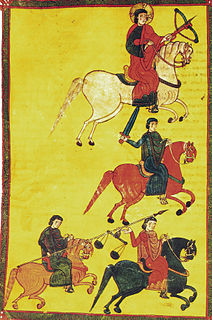 W
WThe Battle of Sagrajas, also called Zalaca or Zallaqa, was a battle between the Almoravid army led by their King Yusuf ibn Tashfin and an army led by the Castilian King Alfonso VI. The battleground was later called az-Zallaqah because of the poor footing caused by the tremendous amount of blood shed that day, which gave rise to its name in Arabic.
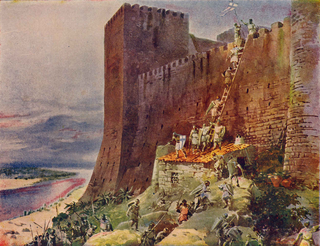 W
WThe Conquest of Santarém took place on 15 March 1147, when the troops of the Kingdom of Portugal under the leadership of Afonso I of Portugal captured the Almoravid city of Santarém.
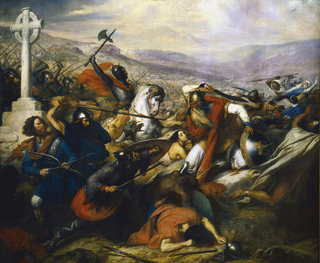 W
WThe Umayyad invasion of Gaul occurred in two phases in 719 and 732. Although the Muslim Umayyads secured control of Septimania, their incursions beyond this into the Loire and Rhône valleys failed. By 759 they had lost Septimania to the Christian Franks, but would return in the 10th century to establish Fraxinet on the Mediterranean coast in France.